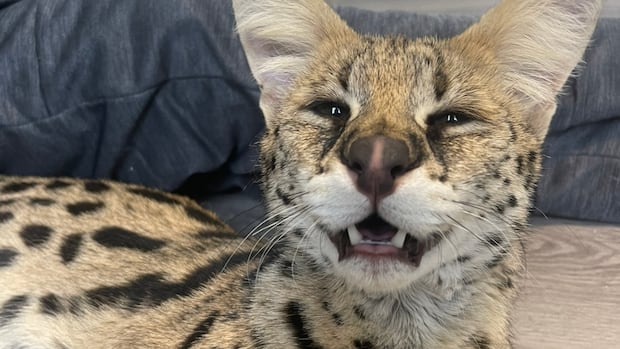
Sanoc owner says that foreign cats require regulation and permission, not complete restrictions
BC’s Central Okagon is a universal owner and worry about Bengal and Savanna Cat Breeder Province Proposal to ban breedingThe sale and future ownership of all foreign and non-wet cats, including servants, Ocelots and European Wildcats.
In a news release on Tuesday, the province stated that animals would be designated as “controlled foreign species,”, which includes a long list, but is not limited to animals such as giraffe, hyinas, jaguar and polar bears.
But Sonu De’Cruz said that regulating breeders and owners would be more suitable and permit would be required instead of completely banning foreign cats.
D’Cruze owns an eight -year -old hospital called Uji, which he described as “cute”, but needs a lot of work.
He spent thousands of dollars attached, both indoors and outside, so that he could roam. She regularly replaces her environment to deal with boredom, and has a giant cat wheel to walk with her – such as people walking on a treadmill, D’Cruz said.

She also takes out approximately $ 700 every month on food: a kibal mix, raw meat and vitamins and supplements.
He said, “We should have been very special about our diet when he was quite small, making sure that he was receiving all proper nutrition,” he said.
De’Cruze is committed to owning her sev, so much that she does not take a holiday, and when she and her husband have to leave for an emergency, there are some select people what they ask to take care of Uzi.
This is a lot
And this is something that D’Cruz finds out that it is not for everyone, and that it should not happen.
However, he said, the entire ban on cats can be very hurry.

She worries that the ban will force breeders and owners to “underground”, and these cats will not get proper care as the owners will be afraid to take them to the vet.
“This is just going to be worse for these cats, if people are being forced to do everything secretly.”
De’Cruze also breed to Bengal and Savanna cats. While neither the breeds were especially mentioned in the release of the province, they were often lamps with those who were lamps.
Not only is she worried that she will not be able to do servants in the future, but she is also worried about her business.
“I am just sitting in Limbo at this point, waiting to see what happens.”
BC foreign cat breeder Catherine Jol said in an email to CBC News that he had broken heart with the proposal of this ban.
“This is a sad situation,” said Joyal. “I understand the need for regulation, but I want attention to education and responsible ownership, not to punish animals.”
She agreed with D’Cruz that the foreign cat is not owned by all.
“When properly lifted, they can become affectionate, loyal and really extraordinary companions.”
The lawyer wants to see the ban expanding
Advocate Rebecca Breder, who specializes in animal law, said that when she understands why a person would be the owner of a foreign cat, “no needs.”
“The bottom line is that they suffer in captivity,” he said. “When a foreign animal, when a wild animal or an animal that is considered wild, has hundreds of kilometers traveling in its genes and instincts and a wide area and for a variety of different things that they eat, their welfare needs cannot be met in the home environment.”

Breder wants to see extended restrictions for other animals, Like Boa Constricter,
The BC SPCA has been an open supporter of the ban on foreign cats, encouraging British Columbians to sign their petition for regulation of all foreign animals.
The organization said that cats are a public safety risk.
The organization said that in 2022, two servants ran away from a breeder on the Vancouver Island, and was captured.
“People were really scared,” BC SPCA Chief Scientific Officer Sarah Dubois told CBC News. “They did not want their children to move into the school bus because again, these are 40 pounds, big, lonned animals, and they could be defensively aggressive.”
Further idea
De’Cruze feels when the restriction proposal has grown in 2019, SPCA seized 13 service Kamalups, BC Near a breeder, when they “lived in terrible circumstances.” At that time, the SPCA said that the idea of these cats living in captivity was “harassing enough,” walk alone in poor circumstances.
On 9 July, SPCA confirmed CBC News in an email that no allegations were ever submitted in that case.
“People who actually caused problems in the first place are getting free,” D’Cruz said. “Now everyone is just being punished.”
De’Cruze hopes that a little more thought will go into the ban.
While the current owners will be able to keep their cats as long as they apply for free permits, D’Cruz hopes that when Uzi passes, she may be able to achieve another untoly.
“We want we want to be an option for one and one, if at that time in our life, we know that we will be able to provide the same level of care provided for our cat, Uzi.”